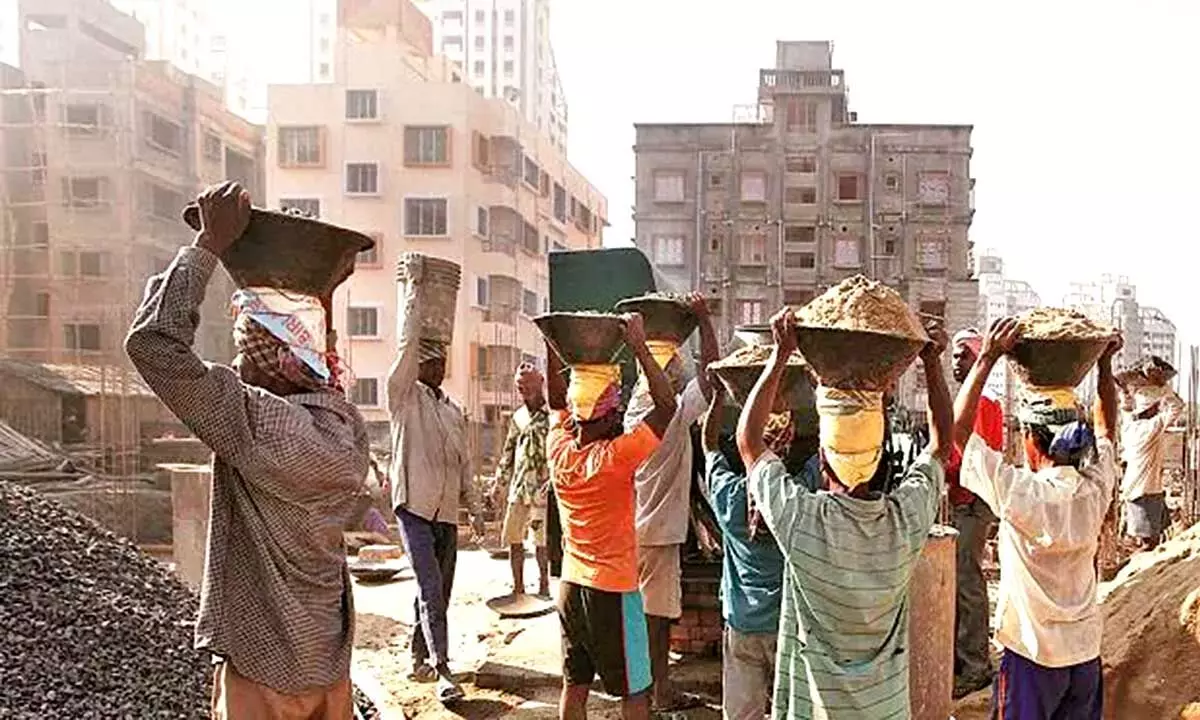Expanding social security coverage for informal workers to be focus areas in 2023
Pursuing States to make rules for labour codes will be another key priority for the govt in 2023
image for illustrative purpose

With India set to host G-20 leaders' summit for the first time next year, the Union Labour Ministry will also pursue key employment-related agenda touching upon global skill gaps, gig and platform economy, sustainable financing of social security schemes and other issues
Expanding the social security coverage for unorganised workers and pursuing states to make rules for labour codes will be the key priorities for the government in 2023, as efforts continue to strengthen the country's labour market. With India set to host G-20 leaders' summit for the first time next year, the Union labour ministry will also pursue key employment-related agenda touching upon global skill gaps, gig and platform economy, sustainable financing of social security schemes and other issues. "Our efforts will be to cover a large number of unorganised sector workers under the ambit of social security schemes in 2023 and provide them with eligible benefits online. We want to make processes paperless in the ministry," Union Labour and Employment Minister Bhupender Yadav said.
The four labour codes on social security, industrial relations, wages, and Occupational Safety Health & Working Conditions (OSH) have already been cleared by Parliament but they can be implemented only when the Centre and states notify the respective rules since labour is a concurrent subject. The Centre is ready with the rules, while some states are yet to complete the rule-making exercise. As many as 31 states and Union Territories have issued draft rules for The Code on Wages, 2019 while 28 states each have done this exercise for The Industrial Relations Code, 2020 and The Code on Social Security. There are 26 states which have issued draft rules under The Occupational Safety Safety Health and Working Conditions Code, 2020. The Centre is working with states for the implementation of the four codes that will be the key in providing social security to all informal workers in the country.
"India has a federal structure. Labour is a concurrent subject. We have already pre-published draft rules on the four labour codes. The states are in the process of completing this exercise. We are pursuing them to complete the exercise. I hope that the codes are implemented at the appropriate time," Yadav said.
The four codes envisage strengthening the protection available to workers, including unorganised workers, in terms of statutory minimum wage, social security and healthcare. They also provide for a statutory right for minimum wages and timely payment of wages for all workers to support sustainable growth and inclusive development. Among others, the codes provide for a uniform definition of 'wages' that will help in reducing multiple interpretations of the labour law and related litigations. It also envisages provisions for annual health check-up and medical facilities to enhance labour productivity and increase life expectancy.
As part of efforts to formalise the employment of more people, the codes also require issuance of appointment letters to every employee of an establishment. Such a system is expected to enhance job security as well as enable a worker to claim statutory benefits such as minimum wage and social security. Under the codes, the gig and platform workers have been defined for the purpose of formulating schemes to provide social security benefits.
Another provision is that the central government may extend benefits to unorganised workers, gig workers and platform workers and the members of their families through Employees' State Insurance Corporation or Employees' Provident Fund Organization. The applicability of Employees' Provident Fund has been extended to all industries under the codes as against scheduled industries at present under the new legal framework. Another major issue will be on the way forward with respect to the Supreme Court order on Employees Pension Scheme 1995 (EPS-95). "We are examining the judgement," Yadav said.
Last month, the apex court upheld the Employees' Pension (Amendment) Scheme, 2014 and allowed employees to opt for enhanced pension coverage alongside their employers in four months' time.
In a written reply to Rajya Sabha earlier this month, Minister of State for Labour and Employment Rameshwar Teli said the apex court judgement has legal, financial, actuarial and logistical implications. As per the court order, employees who were existing EPS-95 members as on September 1, 2014 can contribute up to 8.33 per cent of their actual salaries, as against 8.33 per cent of the pensionable salary capped at Rs 15,000 a month towards pension. It had also struck down the requirement in the 2014 amendments mandating employer contribution of 1.16 per cent of the salary exceeding Rs 15,000 per month. This will facilitate the subscribers to contribute higher to the scheme and get enhanced benefits accordingly.
The Employees Provident Fund Organisation (EPFO) has more than six crore subscribers and a large number of them will benefit from opting for contribution on wages higher than the threshold of Rs 15,000 per month. As the chair of the influential G-20, a grouping of developed and developing nations, India will host the G-20 leaders' summit in November 2023, where labour issues will also be discussed.

